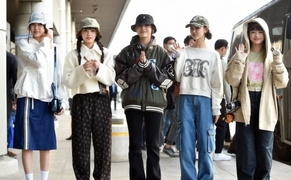 |
| President Yoon Suk-yeol shakes hands with U.S. President Joe Biden at their bilateral summit held at a hotel in Phnom Penh, Cambodia, on Nov. 13, 2022./ Source: Yonhap |
AsiaToday reporter Lee Jeong-yeon
President Yoon Suk-yeol will seek ways to strengthen security alliance with the United States through upcoming summit with U.S. President Joe Biden at the end of the month.
In response to North Korea’s mounting military provocations, such as its recent successful launch of new intercontinental ballistic missiles (ICBM), both Yoon and Biden are expected to discuss various measures in depth to effectively deter North Korea’s nuclear provocations while adopting bilateral cooperation documents on cyber security.
According to the presidential office on Sunday, the major agenda of the upcoming summit between Yoon and Biden, which will be held to mark the 70th anniversary of the Seoul-Washington alliance, will be security cooperation, economic cooperation, and expansion of people-to-people exchanges.
Among them, the most anticipated sector is the security cooperation plan between the two countries. To be more specific, attention is on the possibility that the United States will come up with a concrete implementation plan to support its pledge to strengthen extended deterrence against the North. Since there is difference between the positions of the Yoon administration, which hopes to strengthen extended deterrence on the Korean Peninsula equivalent to the defense of the US mainland, and the Biden administration, which adheres to the principle of ‘denuclearization of the Korean Peninsula’, attention is growing whether the gap between the two countries will be narrowed through the summit.
Some point out that discussions on revising the Korea-US Nuclear Power Agreement are necessary at the summit. Even if it is not possible to demand ‘nuclear self-strength’ from the US, it is necessary to secure ‘nuclear potential’ by initiating discussions on revising the agreement while addressing the issue of spent nuclear fuel as well.
“Strengthening cyber security and additional deployment of strategic assets are necessary, but it is difficult to see them as groundbreaking,” said Jang Sung-jang, head of the Unification Strategy Research Department at the Sejong Institute. “We need to actively talk about the revision of the Korea-US nuclear agreement in the upcoming US visit,” Jang said.
As previously reported, the two countries are preparing to adopt a separate joint document that will advance cybersecurity cooperation. “We are making a document, which will include measures to rebuild trust in information sharing, production, analysis and utilization, and implementation,” a high-ranking government official said.
Information sharing is expected to be at a level equivalent to that of “Five Eyes,” an information sharing network of five countries including the US, UK, Canada, Australia and New Zealand. Some believe that Japan might join, and a potential Korea-US-Japan edition of ‘Five Eyes’ may be launched.
#summit #security alliance #information sharing #Yoon Suk-yeol #Joe Biden
Copyright by Asiatoday
Most Read
-
1
-
2
-
3
-
4
-
5
-
6
-
7





















